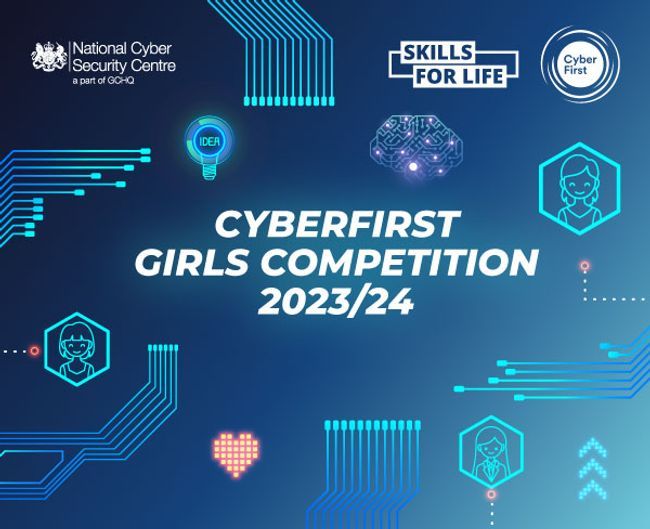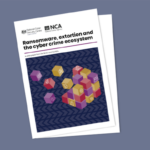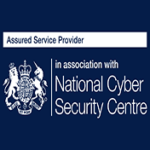
Teachers encouraged to enter schoolgirls into UK’s flagship cyber security contest
Teachers who have previously taken part in the UK’s flagship cyber security contest are encouraging their counterparts across the nation to enter teams of schoolgirls into this year’s competition.
With registration for the eighth annual CyberFirst Girls Competition now open, teachers across the country have shared their experiences of helping students to take part in the contest, highlighting the number of benefits the competition brings to their students as well as the ease of taking part.
The 2023/2024 CyberFirst Girls Competition will see girls across the country try their hand at cracking codes, decrypting messages and solving coding puzzles. Teams must be entered by teachers of any subject, from Computer Science to Art.
The annual competition is run by the National Cyber Security Centre (NCSC) – a part of GCHQ – and aims to introduce girls aged 12 and 13 to cyber security, with the ultimate goal of increasing diversity in the industry.
With women making up just 17% of the UK’s cyber security workforce, it is vital that the next generation of girls is encouraged to explore the opportunities cyber and technology has to offer.
Chris Ensor, NCSC Deputy Director for Cyber Growth, said:
“The CyberFirst Girls Competition is great introduction to the world of cyber that’s both fun and challenging, and it is a great chance for participants to pit their wits against local rivals.
“Thousands of girls have already benefited from the competition, and I strongly encourage schools to register for this year’s event so that pupils can discover a new passion.
“The cyber security industry offers a range of career opportunities, and we have seen participants of earlier competitions secure themselves exciting roles in the sector – which is a trend we want to see continue.”
Roger Carpenter, The Tiffin Girls School, said:
“Cyberfirst has been the best thing ever for getting more girls to take Computing [as a subject]. Our numbers have risen substantially both at GCSE and A Level.
“The puzzles that they solve in the competition are exactly what they like doing and combined with the ‘stopping the bad guys’ aspect really fires them up. Students work from 6 in the morning to midnight to try to solve them!
“It’s clear that the interest in cyber is permanent in some students. Many go on to advanced cyber courses, get their qualifications, and take advantage of the bursary scheme at university. We’ve also had a good number take on the Cyber EPQ, which lets them do some research of their own into cyber issues. Personal statements for UCAS are filled with various cyber achievements, most of which they organise themselves, having gained confidence from CyberFirst. A number also go on to other competitions and one team was the top girls’ team in the country.”
Lewis Parfitt, Chepstow School, said:
“I have entered teams of students into the competition two years running and both years they have absolutely loved it! I love seeing them work together as a group with the online challenges in the first round. They start delegating roles and helping each other out. Real authentic teamwork starts to develop.
“I really enjoyed the in-person regional finals. It’s great to meet other teachers from other schools doing it, and I love being there to support and encourage the students, so wouldn’t miss it for the world.”
Kit Burtenshaw, Bedford Girls School, said:
“Our students always enjoy taking part. They enjoy working together and trying something new. The concept of a competition is exciting, and we try to ramp up the excitement of our teams competing against each other.
“[One year] a student was so inspired she pursued the Cyber Discovery programme and qualified for the paid place on the SANS Foundation Course.”
“I always love the first round and getting as many students engaged as possible. In Year 8 here the girls decide whether to pursue Computer Science in Year 9 as one of their options, and then into Year 10 for GCSE, so it’s a great timing for getting them excited about the subject.
“I love the buzz of the classroom at lunch when we let them drop in and out around food to work on things and hearing them explain how they solved something or got stuck in for a good hour on figuring it out.”
This year’s competition will see teams of girls tackle fun and challenging puzzles, covering topics from cryptography to AI to logic, in a bid to see off rivals and develop cyber skills.
The team with the most points in each of Scotland, Wales, Northern Ireland, and each of the English regions will take home the crown.
The competition opens at noon on Monday 20th November and runs until Wednesday 29th November. This year’s simplified format will see winners announced on the 4th December. Winners from Scotland, Wales, Northern Ireland and all English regions will then be invited to a celebratory gala dinner in February 2024.









